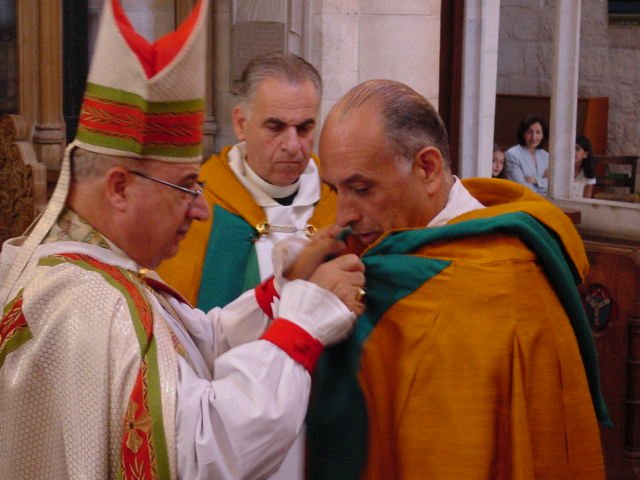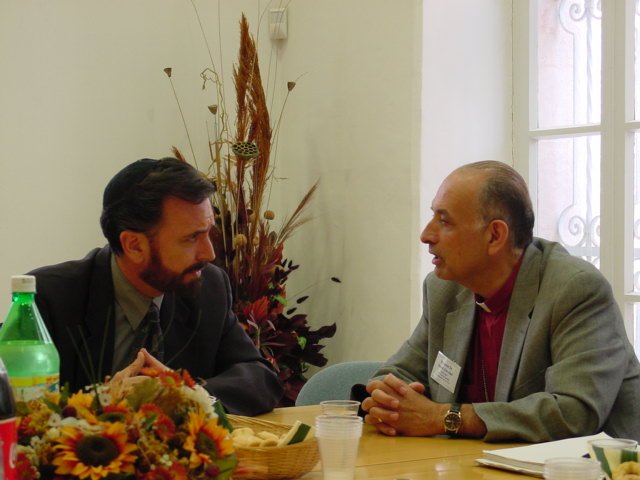October 13, 2002
We had not planned to be part of the group this morning, choosing instead to worship at the altar of Israeli bureacracy and take care of our visas. We arrived at the Ministry of the Interior to find a notice posted in Hebrew. Sagur was the only word Marthame (who has found another valuable use for his seminary Hebrew lessons) could make out: "closed." As we asked around, we discovered what was the cause: a strike, the kind for which Israeli government workers are famous. Based on our own experiences and those of others, we sometimes joke that Israeli bureaucracy exists to frustrate the Gentiles. But in this case, Paul was right: there is neither Jew nor Gentile when it comes to government strikes.
Fahed receives the rank of canon from Anglican Bishop Riah Abu Assal.
Canon Fahed serves the eucharist at Jerusalem’s Anglican Cathedral.
But our cloud of inconvenience had a huge silver lining - we were able to join the group at St. George's Anglican Cathedral for an historic event. Every PC(USA) moderator has the ex-officio honor of being ecumenical canon at St. George's, but until now, only one moderator had come to Jerusalem to receive this honor. The Rev. Dr. Canon Fahed Abu-Akel is the second, and today this honor was given to him as part of the Sunday worship service. The liturgy was done in Arabic and English and sounded at times like how Pentecost must have sounded, but the hymns were wonderful - familiar tunes to both communities, the same tune with different lyrics.
After worship, we gathered with a group of young adults who are staying at the nearby YMCA and participating in a program studying conflict resolution. We all met with Bishop Riah Abu-Assal and heard his challenge to the Western church. He is particularly concerned about the growing popularity of the notion of transfer, as evidenced by signs in Hebrew all over the country declaring, "Jordan is the Palestinian state." He warns that the Middle Eastern Church is enduring serious consequences of the Western church's action (and inaction) regarding the Palestinian situation. A dominant image of Western Christians here is that of the hundreds who come every year (even the past two) explicitly to show their support for the nation of Israel. They come largely with the hopes that the presence of a stong Jewish state will hasten the second coming of Christ and fulfill a very particular eschatological understanding, in which the Jews are finally converted or sent to hell. Never mind that - until then, Israel opens its arms wide to such a powerful political support in the US. Meanwhile, the Christians here wonder who is in support of them. Where are the hundreds of Christians making pilgrimage to show them encouragement? And they fret over the message sent to their Muslim neighbors, that being Christian means pro-Israeli. And their Muslim neighbors feel affirmed in their growing sense that they have been successfully villified in the West.
Mindful of her classes tomorrow, Elizabeth parted with the group and from Qalandia caught a taxi towards Zababdeh. She had an interesting conversation with the other riders about what she is doing in Palestine. The young men in the taxi wanted to tell her in the strongest way that Palestinians do not hate Americans. "We love the American people!" he said. "It's the government policy we hate" (Something both of us have been told innumberable times). We discussed 9/11, and one man said he'd given blood for the rescue effort, when we all thought the tragedy would require massive amounts of blood. Indeed there was a 9/11 blood drive in Palestine, an odd seeming thing considering how much Palestinian blood is already being shed at home. Elizabeth brought up the news footage of Palestinians celebrating after the attacks. He and the others in the taxi asserted that these people were paid to do this by the Israeli government: "They take simpletons and offer them money for this!" Conspiracy theories abound; the challenge is discerning when they are (as happens here) correct. Not convinced that this was one of those times, Elizabeth could agree with the other passengers that it was a real shame that the candle-lit flower-strewn vigils, the blood drive, the general dismay among Palestinians didn't make the same heavy rotation on the Western news. The young men urgently wanted Elizabeth to share with her friends and family in America that Palestinians don't hate them. So, there you are, yaa shabab.
Fahed meets with Rabbi Cohen of the American Jewish Committee in Jerusalem.
Meanwhile, the Marthame and the Moderator's group went over to West Jerusalem to meet with Rabbi Cohen, the director of the American Jewish Committee. Born in Britain, he is an Orthodox rabbi and has worked in leadership positions in Ireland and South Africa. He presented himself as a faithful, progressive Jew, willing to work in cooperation with Palestinians, and no doubt that's the case - the question remains under what stipulations. When asked about the suffocating siege in Nablus, he replied that faithful Jews should feel awful about it, but suicide bombings leave the government with no other recourse - utility before ethics. If this is the progressive Israeli politics, de-escalation doesn't seem likely.
Fahed meets with Mufti Sabri.
Our next visit in the interesting headwear department (with bishops, rabbis, and muftis we've got quite a collection!) was the Mufti of Jerusalem, Akram Sabri, whom we met in his home not far from Qalandia. His major concern was the recent US congressional act which, at least on paper, recognizes Jerusalem as the capital of Israel, making the USA one of perhaps three countries in the world that do so. The Mufti considered us important ambassadors to bring back the message that this move is provocative and unjust both morally and according to international law.
Latin Patriarch Michel Sabbah with the Rev. Dr. Victor Makari, head of the PC(USA)’s Middle East office.
Finally, to round out our interfaith-ecumenical meetings, we met with Latin Patriarch Michel Sabbah. We have come to respect him deeply in our time here, both for his spiritual depth and candor and for his pastoral care of his congregations and parishioners. He is a quiet man, and soft-spoken, and even more so now - it seems that the situation has worn on him over the last two years. He eloquently stated that the Palestinian Christians have a particular calling, and that is to be custodians of the faith in the land of its birth. He is asking them not to abandon this call, but to embrace it - with all of the difficulty that might mean.
Elizabeth arrived safely in Zababdeh and proceeded to grade some papers in preparation for tomorrow.





